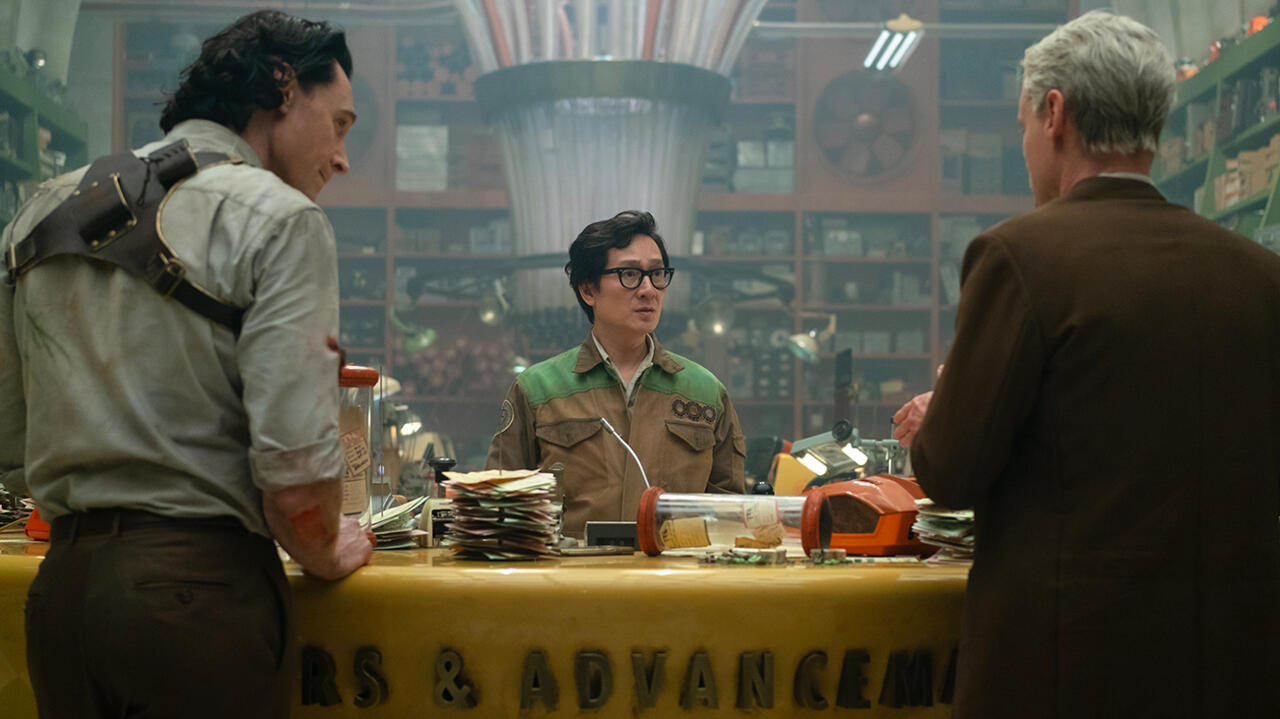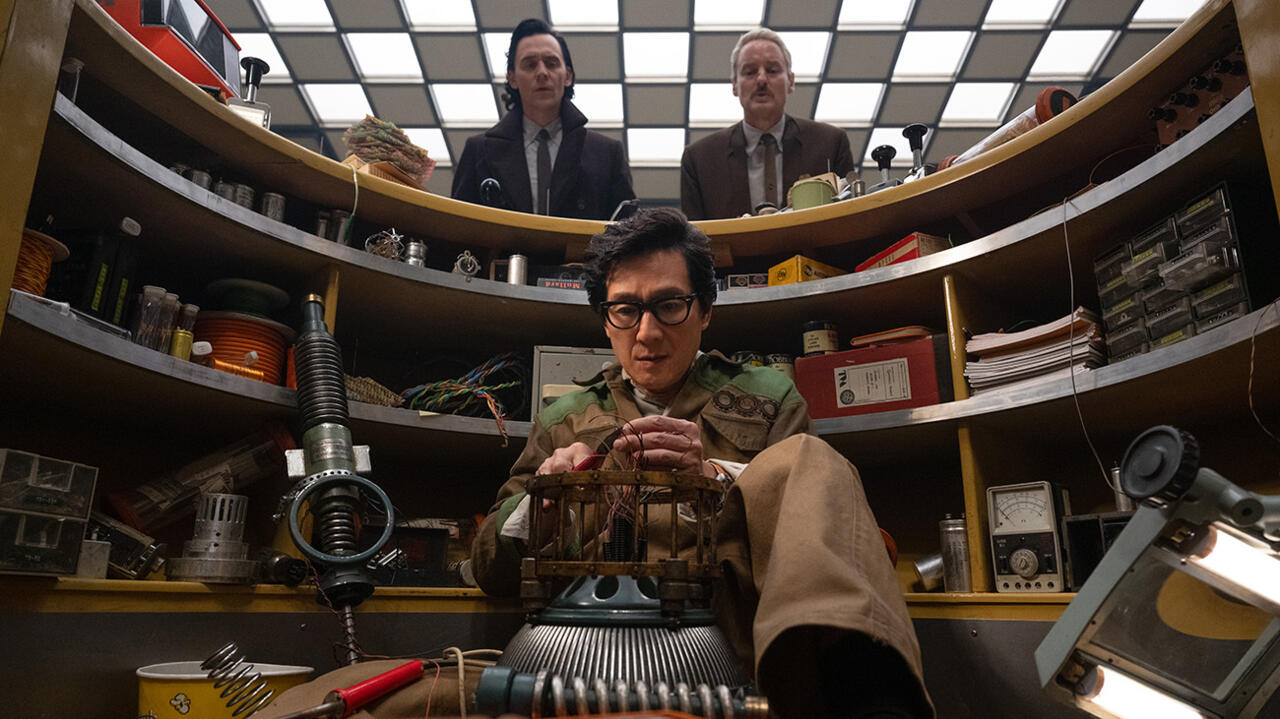Loki Season 2 is an exemplary example of the state of the Marvel Cinematic Universe these days. As a production, it's immaculate. It's very well put-together with even better production design than the first season had, we've got a stellar cast without any annoying characters, and it doesn't over-indulge itself on fake-looking CGI sets. However, as a story, I can't tell if it's a carefully layered mystery or just another massively rejiggered MCU plot that doesn't end up meaning much of anything.
After watching four of the six episodes of Loki Season 2, I'm leaning toward the latter--but the pieces are there for them to prove me wrong.
The show starts off on the wrong foot in that regard, because it doesn't actually address what the cliffhanger from the end of Season 1 was about. Oh, I've got a pretty good theory--though I'll spare you the spoilers for now--but the answer isn't given in the episodes that were shown to critics.
Season 2 picks up directly where the Season 1 finale left us, with Loki inside a version of the Time Variance Authority that has a gigantic He Who Remains statue in it--and where Mobius and Hunter B-15 don't know him. They quickly realize Loki doesn't belong and they chase him, but then his body compresses into nothingness and disappears.

And then he reappears back at the TVA from last season, with his pals Mobius and B-15 trying to figure out what to do about all the new timeline branches. But he can't seem to stay in one place--Loki keeps popping in and out of existence. He's apparently time-traveling to the TVA's past and future, or time-slipping, as new character Ourobouros calls it. But Ourobouros, who seems to know more about the mechanics of the TVA than anyone else left alive, says time-slipping isn't possible in the TVA.
Except it clearly is happening. But why? What about the state of the TVA (perceived or real) changed to allow it, and why is it happening to Loki? Despite this situation being the very first main story thread of the season, neither of those questions is asked or answered in the four episodes we've seen.
It's a little bit hard to take at this point, but that's par for the MCU course in recent years.
There's a chance that the remaining episodes will bring everything together. It might even be a reasonable expectation--like I mentioned before, I've got some theories I feel pretty good about because the pieces are there for it to make sense. But even if you don't take into account Jonathan Majors' real-world legal issues, which sprung up after they shot these episodes and almost certainly required some kind of reworking of this story, the MCU doesn't deserve the benefit of the doubt after years of setting up many things and paying off almost nothing.

It's a big frustration because Loki Season 2 is an outstanding moment-to-moment experience. It looks great, has a really nice flow, and doesn't use CGI as a crutch the way Season 1 sometimes did. Tom Hiddleston and Owen Wilson are even more of a delight this time around as Loki and Mobius, and new arrival Ke Huy Quan as Ourobouros, who designed and wrote the manual for all of the TVA's technology, steals the show. Sophia di Martino's Sylvie has a very different tone now that she's freed from the life that He Who Remains forced upon her--she's operating at a lower speed in Season 2, and it's a nice little shakeup.
Aesthetically, it's just so nice that Season 2 isn't as overtly reliant on CGI environments as Season 1 or the rest of the MCU has been. It's delightful to return to the brutalist architecture of the TVA, certainly, but perhaps the most impressive parts for me came during the trip to 19th-century Chicago in the third episode. The adventure at the 1893 World's Fair required plenty of CGI flavoring, but there are tons of practical old-timey sets in use during these parts, too. And I appreciated that effort, as a history nerd.
But it's also in this episode where Majors takes center stage. Majors' real-world issues this year have been very well-documented, and it's impossible not to think about them while watching Loki Season 2, and in a lot of different ways. Nothing happens in a vacuum in the MCU anyway, but that goes triple for everything involving Jonathan Majors. For example, there's the unease of trying to enjoy a performance by someone who has been accused of domestic violence. And there's the knowledge that those allegations, which arose after Season 2 was shot, must have impacted the story not just in these episodes but in the greater MCU, since there's a whole Avengers movie planned about his character.
So I could sit here and say that Majors gives a quirky and rather fun performance as Victor Timely, a He Who Remains variant--or possibly the original one in the MCU–or that his arc in the third and fourth episodes is pretty compelling and is a nice counter to the raging Kang from Ant-Man & the Wasp: Quantumania. Those things are true, but saying them doesn't tell the whole story.

That's how it is when we deal with Majors, and it's how it is for the MCU in a greater sense. It's the slickest nerd franchise in the world, with massive production values being put into all sorts of wild and outlandishly awesome sci-fi and fantasy stories. When you look at it from a top-down view, especially with something like Loki, which nails every aesthetic note it needs to, it's easy to think that sentence sums it all up.
But in our reality, Loki is a series that contains no references to any part of the MCU aside from Loki's own past--this remains true through the four episodes of Season 2 I have watched--and no other pieces of the MCU have made even veiled references to the events of this series. The things happening on this show are supposed to be important, but it can't even really deal with the multiverse in any kind of meaningful way--Season 2 is more like a time-travel show than a multiverse one.
Folks who aren't worried about the bigger picture will probably enjoy Loki Season 2 as much as they've enjoyed everything else in the MCU. For those of us who can't make ourselves forget the dozens of movies and shows that are on the timeline already, it feels like yet another puzzle piece that doesn't fit. I hope I'm wrong.